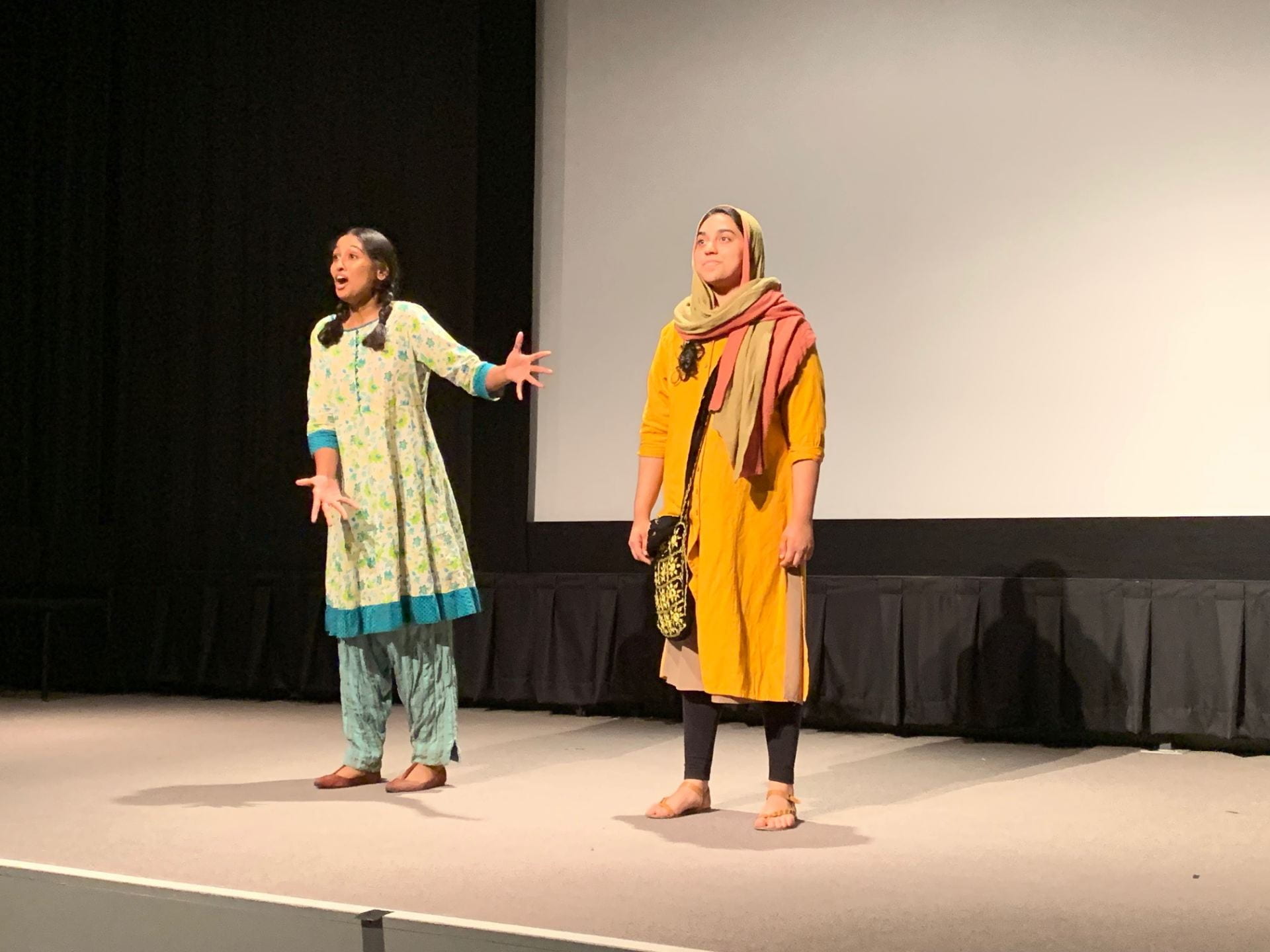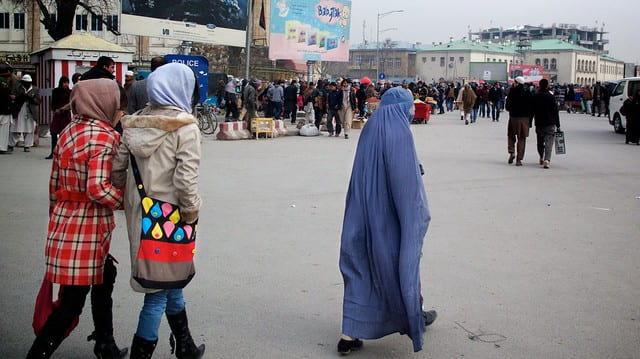On the Front Lines marked a turning point in the evolution of theater and cross-cultural learning at The Ohio State University (OSU). The project’s purpose of bringing the voices, lived experiences and cultural contexts of Afghan women to our campus and the world through theater was met with immense interest and enthusiasm. Ohio State hosted six events in the fall of 2019 as part of On the Front Lines (OTFL), including the performance of two plays commissioned for the project.
Lesley Ferris, Distinguished Arts and Humanities Professor of Theatre, director of the On the Front Lines project, worked with Sahar Speaks, an Afghan journalism project that provides training, mentoring, and publishing opportunities for Afghan women reporters.” A central question asked is: “How can the world see the true Afghan story, if there are no Afghan female writers, photographers, camera operators, or TV producers at foreign news outlets?” (http://www.saharspeaks.org/). Their stories were published and permission was achieved to adapt them for the stage. Four plays were produced in London and the 5th and 6th plays became the centerpiece for this project. as Sahar Speaks: Voices of Women from Afghanistan. Lesley Ferris co-founded Palindrome Productions, a London based theatre company that produced the first four plays.
The main event was the performance of two one-act plays about daily life in Kabul for Afghan women. The plays premiered at Ohio State University during Fall of 2019 and were accompanied by an array of academic events delving into the history and current context of Afghanistan (See below). Local community members and students across multiple departments at Ohio State flocked to the plays and related events. The result was a rich synthesis of the fields of theatre, history, journalism, and literature.
The Department of Theatre and the Middle East Studies Center decided to create the project in response to the current geopolitical situation of Afghanistan and its people. They organized this collaborative project with faculty and staff in the Department of History, Communications, the Near Eastern Languages and Cultures (NELC) Department, the Wexner Center for the Arts, and the Middle Eastern and Islamic Studies Collection and the Lawrence and Lee Theatre Institute at the University Library. The Global Arts and Humanities Discovery Theme awarded a grant to ensure the artistic vision of the Director could be fulfilled, especially with regard to the theatre productions (See below, Oct. 7) but also the outreach events and engagement with students and faculty. The following list of events feature top scholars on topics relevant to Afghan history and culture, including the history of Afghan theatre, theatrical practices that the military uses for simulating field operations in Afghanistan, and a talk on “the Great Game.” Complete information on the guest artists and scholars can be found on this page.
Events:
10/03/2019 Lawrence and Lee Theatre Research Institute Annual Lecture: Nushin Abrazadah: Shakespeare Among the Suicide Bombers: The Turmoil of Theater in Afghanistan, introduction of speaker by Jeanine Thompson, Professor of Theatre and Director of the Theatre Research Institute and Beth Kattelman, Curator of the Lawrence and Lee Theatre Research Institute and Jeanine Thompson, Director . Audience: 91 people in attendance.
10/07/2019 Sahar Speaks, commissioned by Palindrome Productions of London and adapted for the stage from stories by Afghan women, two one-act plays (see images below). Audience: 279 people in attendance.
Parwana: They Bear All the Pain by Alia Bano
Dust Allergy by Nushin Arbabzadah
Discussant: Meenakshi Ponnuswami, Associate Professor of English at Bucknell University
10/07/2019 Dutch photojournalist Joël van Houdt presented “Kuja Meri?” (Where are you going?): Afghan Refugees Across the Globe, Discussant: Amie Ferris-Rotman, Moscow correspondent for the Washington Post. Introduced by Ann Hamilton, Distinguished University Professor in the Department of Art, Post-talk discussion led by Philip Armstrong, Professor of Comparative Studies. Audience: 98 people in attendance.
10/08/2019 Professor Natalie Alvarez, Ryerson University: Strategic Culture: Staging Afghanistan to Simulate War, Introduction of the speaker by Professor Scott Levi, History Department Chair, Discussant: Professor Peter Mansoor, General Raymond E. Mason, Jr. Chair in Military History. Audience: 50
10/31/2019 Distinguished Arts and Humanities Professor of Theatre, Dr. Lesley Ferris: On the Road to the Pentagon: The Great Game Afghanistan. Introduction of the speaker by Professor Scott Levi, History Department Chair. Audience: 42 people.
11/04/2019 Film Screening of A Thousand Girls Like Me, by Sahra Mani (2018) Introduction by Janet Parrott, Theatre Department Chair, Discussant: Linda Mizejewski, Distinguished Professor of Women’s Gender and Sexuality Studies. Audience: 35
Next Steps:
On the Front Lines: Performing Afghanistan will continue engaging authentic voices of Afghanistan and beyond through theatre and will build community around the issues brought up in the stories and plays. The Middle East Studies Center plans to host related discussions on politics, culture, and global issues related to issues raised in the plays. The inaugural faculty forum and subsequent events will bring faculty together to define research questions which engage the local community. [Plans for the first meeting to take place spring semester of 2020 were derailed by the pandemic and the closing of the university.]
We are currently evaluating our learning from the first phase of the project and are seeking ideas for the next phase. We are in consultation with the faculty involved in the first phase and may invite new input from faculty in Near Eastern Languages and Cultures Women, Gender and Sexuality Studies, and other departments. The public engagement and interest in the plays is our major consideration moving forward as we see this as an avenue offers cultural knowledge in an effective way. As we continue to assess this project and related activities we are brainstorming creative educational design and the use of e-portfolios and other means to deepen student learning.
Film making is the next big step in the project, and we will be posting further updates about a documentary and other shorter films. We need support to make the next phase happen, in terms of both time contributions and financial. We are seeking students and community members who have skills in that area, financial contributions, and other forms of support on our website page inviting people to contribute as a member of our community.
We want and plan to keep the momentum going. A video artist filmed the project and the footage includes the performances, lectures, and interviews with the actors, playwrights, directors, artists, journalists, and project leaders. This material needs to be edited and plans are underway for that to happen. The final addition to On the Front Lines is a documentary that demonstrates our process and methods for utilizing multiple cultural perspectives, with all the pitfalls encountered as well as its gratifying aspects We plan to create a public-facing digital portal and e-portfolios for Ohio State students to track and reflect on their learning and experiences.
Plans are underway for all six Sahar Speaks plays to be produced in London. We hope this could align with the next London Theatre Program in the summer of 2021. If so, students from the university will be involved and plans for using a video artist to document this follow-up project of “On the Front Lines: Performing Afghanistan.” We are also planning technologically mediated activities to connect with audiences using a combination of video and virtual live engagements in order to accommodate new realities for theatre created by COVID-19.
Please follow the project at on this site and Palindrome Productions. Think you could help? We need many forms of support – sign up here.
Please read the final report for complete details.

Parwana: They Bear All the Pain by Alia Bano, Director: Ji Rye Lee, Dramaturg: Anna Guse. Above: Premiere on Oct. 7, 2019, Rithika Gopalakrishnan, left; Mehek Sheikh, right. Photo credit: Kirk Moldoff


